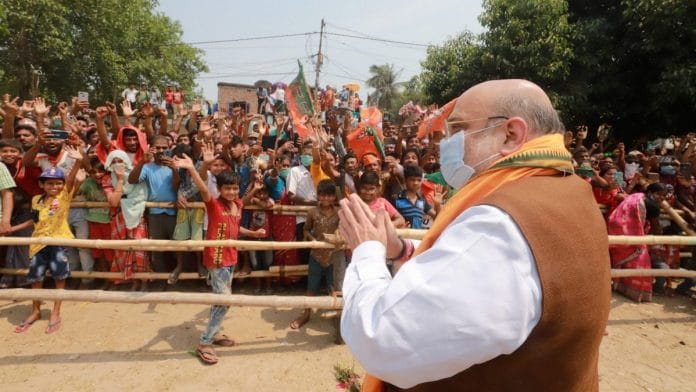The Ministry of Home Affairs has asked West Bengal governor Jagdeep Dhankar for a report on the law and order situation in the state, which witnessed violence in the aftermath of the Trinamool Congress’ victory in the assembly election. It had earlier sought a report from the state government but received no response. Several houses and shops belonging to Bharatiya Janata Party workers and leaders were reportedly attacked, so much so that the governor advised Chief Minister Mamata Banerjee, soon after the swearing-in ceremony, to urgently attend to the issue of raging post-poll violence in Bengal.
Ideally, one of the first things Mamata Banerjee should have done after taking charge of the state is to forget and forgive the immediate past and get down to fighting the bigger adversary, the Covid-19 pandemic. But her first decision, as claimed by governor Dhankar, was to order not to send any report about the violence to him. This clearly indicates her preference to adopt a confrontationist stand against the Centre. And the BJP should have seen it coming, given the acrimonious election, which has become an unfortunate norm in Indian politics.
A number of BJP candidates who contested this election were new faces and not fully oriented in the peculiar ‘Bengal political culture’. It was, therefore, naïve on their part to have expected a peaceful post-poll situation in West Bengal. Many of them have promptly returned to the safety and comfort of their homes in Delhi or elsewhere. Some of them are active on social media and have condemned the ongoing violence in places that were their constituencies till about a week ago.
They should have stayed back and assured their voters and supporters of protection and safety. It is not too late even now for these ‘parachuted leaders’ to rush to their constituencies and be among the people. But many of them seem content with holding dharnas outside West Bengal and hogging the limelight.
Also read: Mamata announces Rs 2 lakh compensation for kin of 16 post-poll Bengal violence victims
Bengal’s culture of political violence
West Bengal has a history of settling authority issues in politics through muscle power and violence. The pre-Partition riots, the Noakhali incident and post-Independence violence are some of the blots in Bengal’s past. Before the Left Front took hold of Bengal for more than three decades beginning with the 1977 assembly election, the Congress party was the victim of extreme violence at the hands of the Communist party.
The organised attacks against landed class, Congress leaders and workers in the late 1960s and ’70s prompted even then-Chief Minister Siddhartha Shankar Ray to leave the capital city of Kolkata (then Calcutta), thus handing over the political space to the Marxists. The Congress’ central leadership accommodated him in the Union Cabinet. The party did not fight back nor did it come to the rescue of its workers. As a result, the Communists virtually had a free run in Bengal, which they ruled for the next 34 years uninterrupted.
What followed was a repeat of history with parties changing position. This time, it was the turn of the Mamata Banerjee-led Trinamool Congress to hit the streets and do to the Communists what they did to the Congress. Nandigram became a battlefield, politically and literally. Nandigram was the scene of violent clashes during the agitation to block the setting up of a chemical hub there. In 2008, the ruling CPM was trounced and the TMC tasted one its first electoral victories. Mamata Banerjee, who cut her teeth in politics in Nandigram, led the street fight and rode to power in 2011. Ironically, the same Nandigram rejected her this time, electing BJP candidate Suvendu Adhikari, who till last year was TMC’s MLA.
Also read: Where is the opposition in Modi’s India? It is here and finally with a face
But West Bengal is not Kerala
The Bengal violence is reminiscent of the violent clashes and revenge killings between the CPM and RSS cadres that rocked Kerala some years ago. In the 1970s, a large number of CPM cadres began to gravitate towards the RSS. The CPM feared an exodus would result in strengthening the BJP’s political base in Kerala. Pitched battles, bomb attacks and counter-killings became a daily routine. Ironically, the ideological moorings of the mindless violence did not result in political dividends to either CPM or BJP.
Unlike the Kerala situation, the violence in West Bengal does not seem to have any ideological basis because the TMC does not profess a strong political dogma like the Communist party or the BJP. It began as an alternative to the Congress, which vacated the political space to the CPM in the face of extreme violence. Mamata Banerjee, who ousted the CPM, would like to see the back of the BJP and not concede the party any political space in the state by using violence as a strategy.
This may not work for her this time, though, because the BJP seems to be equally strong in all the tricks she might be contemplating. As a cadre-based party with a strong support base of affiliated organisations and a charismatic leader in Narendra Modi, the BJP is far superior in political management. Besides, for a party that has grown from three seats in the state assembly (2016) to 77 seats in five years (2021), dislodging the TMC is only a matter of time, a challenging task but not impossible.
All the political parties, especially the TMC, will have to reign in their cadres and put an end to the cycle of violence in West Bengal immediately.
West Bengal as a border state has many more milestones to achieve than merely add itself to the list of poverty-stricken states. Mamata Banerjee will have to change her attitude towards the Union government and so does the Centre towards West Bengal to maintain the spirit of cooperative federalism.
Seshadri Chari is the former editor of ‘Organiser’. Views are personal.
(Edited by Prashant Dixit)






